Deborah Swift's Blog, page 55
November 23, 2010
Big Box of Books from the Big Apple, and Giveaway news
 The Lady's Slipper is out today in the US and the lovely big box of books has just arrived!
The Lady's Slipper is out today in the US and the lovely big box of books has just arrived! You can see that my cat Tabby was fairly impressed by the whole thing and has begun to read it already.
 To coincide with the launch two lovely bloggers are featuring my book:
To coincide with the launch two lovely bloggers are featuring my book:An interview about my writing life at Tanzanite's Castle
and a competition and giveaway at Historical Fiction to win a signed limited edition hardback (open worldwide).
Thanks to Daphne and Arleigh for posting today.
Published on November 23, 2010 08:42
November 19, 2010
How to be a slightly more Professional Writer
You can find my post about how to be slightly more professional at the Historical B&B's
Published on November 19, 2010 10:09
November 17, 2010
My love affair with historical fiction
This interview is reproduced courtesy of the Macmillan New Writers Blog. Aliya Whiteley asked me how I came to write historical fiction.
Before I came to write The Lady's Slipper, most of my writing was contemporary. I read a lot of contemporary fiction as well as historical fiction. A few years ago I would have been surprised to find I had produced a historical novel. So why write one?
The answer is that it wasn't a case of me deciding on a period and then setting the novel there, it was more that my characters demanded certain conditions to flourish and tell their story. I started with a character who wanted to paint an orchid - I had seen the rare lady's-slipper orchid myself and wanted to write (initially) a poem about it. This desire was subverted into my character's desire to capture it in paint. From then on the character grew and developed. I thought for the flower to have impact I needed a time when ideas about botany and images of flowers were new and fresh. Perhaps a time before mass printing, a time when herbs and flowers were used for healing. This led me to the 17th century when herbalists such as Nicolas Culpeper were just making their mark on history and the science of botany was in its infancy.
The idea of the medicinal use of the lady's-slipper then sparked the character of Margaret the herbalist, whose views on "the web of the world" were a very different religion from the conformist view of the time. I am interested in the different ways that faiths have shaped the world and this tied in nicely with the burgeoning Quaker movement, viewed in the 17th century as radical and dangerous. I couldn't resist having a Quaker character, so Richard Wheeler was born. In addition, the Quaker movement started close to my home in Westmorland, and visits to the still surviving historical sites fascinated me.
I was also keen to exploit the enmity between two men, and needed an atmosphere of unease where people felt unsafe so that the developing plot would be credible. The English Civil War where the King had been beheaded by his own people supplied the background disturbance I needed.
My second book, The Gilded Lily (on the editors desk) is set in the same period through necessity as it features Ella, one of the characters from The Lady's Slipper. It is a very different book as it is set in restoration London, a choice made so that I could exploit the desire for wealth and luxury which is a part of Ella's character. I will have to apologise to readers though, as the book features the Thames frozen over, which in fact happened in 1662 and not in 1661 as my book would suggest. This is because I didn't know I was going to write The Gilded Lily when I began The Lady's Slipper and unfortunately I cannot bend history - only apologise when I have had to do so.
The one I am working on now will be set in a different period. As with the first two I am looking for a time and place where my characters and ideas will collide in the most satisfying way. At the moment that seems to be turn of the 16th century in Spain. I can't tell you much more about it because I want to keep the excitement about it inside and not let it dissipate until I have a first draft in front of me.
Now though, I find I enjoy the researching period such a lot, and the wonderful excuse it gives me to hang around museums, historic houses, art galleries and libraries. And I have discovered some fantastic writers in the historical fiction genre, who have given me further insights into our rich heritage. So I cannot imagine that I will run out of ideas from the wealth of our history, and I guess that will keep me writing historical fiction for a while yet!
Aliya asked how I communicate my passion for the period to the reader, but I've really no idea. I just loved writing about the seventeenth century, and my revelling in it I hope will somehow be transmitted, maybe through the language of my characters.
Thanks Aliya for your questions.
Deborah
Before I came to write The Lady's Slipper, most of my writing was contemporary. I read a lot of contemporary fiction as well as historical fiction. A few years ago I would have been surprised to find I had produced a historical novel. So why write one?
The answer is that it wasn't a case of me deciding on a period and then setting the novel there, it was more that my characters demanded certain conditions to flourish and tell their story. I started with a character who wanted to paint an orchid - I had seen the rare lady's-slipper orchid myself and wanted to write (initially) a poem about it. This desire was subverted into my character's desire to capture it in paint. From then on the character grew and developed. I thought for the flower to have impact I needed a time when ideas about botany and images of flowers were new and fresh. Perhaps a time before mass printing, a time when herbs and flowers were used for healing. This led me to the 17th century when herbalists such as Nicolas Culpeper were just making their mark on history and the science of botany was in its infancy.
The idea of the medicinal use of the lady's-slipper then sparked the character of Margaret the herbalist, whose views on "the web of the world" were a very different religion from the conformist view of the time. I am interested in the different ways that faiths have shaped the world and this tied in nicely with the burgeoning Quaker movement, viewed in the 17th century as radical and dangerous. I couldn't resist having a Quaker character, so Richard Wheeler was born. In addition, the Quaker movement started close to my home in Westmorland, and visits to the still surviving historical sites fascinated me.
I was also keen to exploit the enmity between two men, and needed an atmosphere of unease where people felt unsafe so that the developing plot would be credible. The English Civil War where the King had been beheaded by his own people supplied the background disturbance I needed.
My second book, The Gilded Lily (on the editors desk) is set in the same period through necessity as it features Ella, one of the characters from The Lady's Slipper. It is a very different book as it is set in restoration London, a choice made so that I could exploit the desire for wealth and luxury which is a part of Ella's character. I will have to apologise to readers though, as the book features the Thames frozen over, which in fact happened in 1662 and not in 1661 as my book would suggest. This is because I didn't know I was going to write The Gilded Lily when I began The Lady's Slipper and unfortunately I cannot bend history - only apologise when I have had to do so.
The one I am working on now will be set in a different period. As with the first two I am looking for a time and place where my characters and ideas will collide in the most satisfying way. At the moment that seems to be turn of the 16th century in Spain. I can't tell you much more about it because I want to keep the excitement about it inside and not let it dissipate until I have a first draft in front of me.
Now though, I find I enjoy the researching period such a lot, and the wonderful excuse it gives me to hang around museums, historic houses, art galleries and libraries. And I have discovered some fantastic writers in the historical fiction genre, who have given me further insights into our rich heritage. So I cannot imagine that I will run out of ideas from the wealth of our history, and I guess that will keep me writing historical fiction for a while yet!
Aliya asked how I communicate my passion for the period to the reader, but I've really no idea. I just loved writing about the seventeenth century, and my revelling in it I hope will somehow be transmitted, maybe through the language of my characters.
Thanks Aliya for your questions.
Deborah
Published on November 17, 2010 04:20
November 11, 2010
Deborah's Historical Fiction Blog Tour
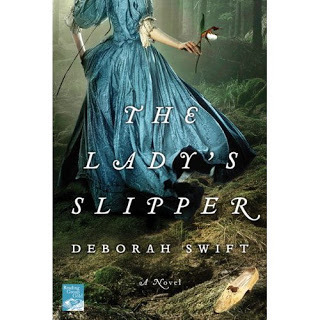 To celebrate the launch of The Lady's Slipper in the US, I am doing a blog tour the week before and the week after the launch on the 23rd November.
To celebrate the launch of The Lady's Slipper in the US, I am doing a blog tour the week before and the week after the launch on the 23rd November.The following beautiful blogs are going to be a part of it:
http://www.shelfandstuff.blogspot.com/
http://www.historicalbellesandbeaus.com/
http://www.historical-fiction.com/
http://www.macmillannewwriters.blogspot.com/
http://www.historicaltapestry.blogspot.com/
http://www.muse-in-thefog.blogspot.com/
http://www.passagestothepast.com/
and last but by no means least,
http://www.readingthepast.com/
Thank you to them all. If you love historical fiction, these are my favourite sites, why not check them out. More details about the posts soon. See you there!
Published on November 11, 2010 07:22
November 8, 2010
Book Piracy Update
When my publishers copyright department checked out the site advertising free downloads of The Lady's Slipper, they discovered that the site is hosted in Moldavia and registered in Russia. It appears to be a malware site used to infect unsuspecting visitors machines rather than a genuine book download site i.e. there is no copyright infringement.
However, what that does mean is that anyone trying to download the book for free may end up with a nasty surprise! Ho ho ho.
However, what that does mean is that anyone trying to download the book for free may end up with a nasty surprise! Ho ho ho.
Published on November 08, 2010 04:26
November 4, 2010
Thoughts about my new Kindle
Whilst at a conference another writer showed me her Kindle, and its lovely hot pink leather cover. Initially attracted by the aforesaid lovely cover, despite my dyed-in-the-wool technophobia, I went over for a closer look. At that point another writer (male) then whipped out his coverless Kindle, and began to outline the advantages of e-reading, its functions and features, gadgets and buttons. I let him try to explain the ins and outs of downloading, whispernet and so forth, whilst dying to ask, does the cover come in other colours?
Anyway, the upshot of the three-way conversation is that I now have my own Kindle (complete with burgundy leather cover). The first thing I noticed when shopping via Amazon was how different the top 100 books look in the US and the UK. In the US - thrillers, cook-books and erotica. In the UK, reprints of the Adventures of Sherlock Holmes, Great Expectations, Sense and Sensibility, The Iliad by Homer, and Mrs. Beeton's Household Management. This is I'm sure more to do with what you can download free than anything else, but it painted a wonderful picture of the States as full of thrill-seeking, hedonists who enjoy a good meal, whilst the English are sensible but with great expectations, a penchant for latin, and with households that need managing in the Victorian manner. (Could there be some truth there, I wonder?)
Anyway, what the Kindle is good for from a historical novelist's viewpoint is that you can download obscure out of print historical documents and books that you might need for reference. On my Kindle I now have an etymological dictionary (downloaded free), several plays by 17th century playwrights such as Kyd and Middleton, (bought for pennies) Pepy's Diary, some obscure papers on sword fighting, and various other research PDF's downloaded from various universities. It is much nicer to do my research with them all loaded neatly onto the handy slim screen, and I can carry most of my research, including the stalwart Wikipedia, now in one volume. What I miss is being able to browse, and the fact that I can usually remember whether a line I'm looking for is on the left or right page as I am reading, thus making it eaier to find.
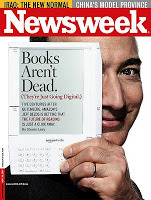 The Kindle is useless too for those lovely illustrated non-fiction books which show you things like how a flintlock pistol works, or pictures of costume or art and architecture. But for text, I have to say it is easy to read and has some great features like a built in dictionary so you can click on a word you are unfamiliar with and it will give you a definition.
The Kindle is useless too for those lovely illustrated non-fiction books which show you things like how a flintlock pistol works, or pictures of costume or art and architecture. But for text, I have to say it is easy to read and has some great features like a built in dictionary so you can click on a word you are unfamiliar with and it will give you a definition.
And won't I look cool when I finally get my pebble glasses and zimmer frame and can use an e-reader instead of carrying great sackfuls of Large Print books around!
The cost of e-books is a hot potato right now. In my previous post on piracy I wrote that you can already download a pirated version of my book. In this post from the Guardian, you can see that readers want their books as cheaply as possible, and have been giving expensive e-books by well-known authors 1 star reviews in order to protest at the cost of books for the Kindle. These readers may turn to pirated books if the ebook prices remain as high as they are. But I can guarantee that none of those readers are also writers!
So far apart from out of print or classic works I have downloaded "The Wilding" by Maria McCann at almost the full price of a paperback, for the convenience of having it there whilst travelling. And I have no doubt that if I like it, it will get 5 stars and a good review from me on Amazon. I, like everyone else, want cheap books for my Kindle, but not at the expense of living writers whose work and creativity I am prepared to pay for.
As I am new to the Kindle, any tips, tricks or thoughts will be much appreciated, provided they are in plain english and not in technojargon!
Anyway, the upshot of the three-way conversation is that I now have my own Kindle (complete with burgundy leather cover). The first thing I noticed when shopping via Amazon was how different the top 100 books look in the US and the UK. In the US - thrillers, cook-books and erotica. In the UK, reprints of the Adventures of Sherlock Holmes, Great Expectations, Sense and Sensibility, The Iliad by Homer, and Mrs. Beeton's Household Management. This is I'm sure more to do with what you can download free than anything else, but it painted a wonderful picture of the States as full of thrill-seeking, hedonists who enjoy a good meal, whilst the English are sensible but with great expectations, a penchant for latin, and with households that need managing in the Victorian manner. (Could there be some truth there, I wonder?)
Anyway, what the Kindle is good for from a historical novelist's viewpoint is that you can download obscure out of print historical documents and books that you might need for reference. On my Kindle I now have an etymological dictionary (downloaded free), several plays by 17th century playwrights such as Kyd and Middleton, (bought for pennies) Pepy's Diary, some obscure papers on sword fighting, and various other research PDF's downloaded from various universities. It is much nicer to do my research with them all loaded neatly onto the handy slim screen, and I can carry most of my research, including the stalwart Wikipedia, now in one volume. What I miss is being able to browse, and the fact that I can usually remember whether a line I'm looking for is on the left or right page as I am reading, thus making it eaier to find.
 The Kindle is useless too for those lovely illustrated non-fiction books which show you things like how a flintlock pistol works, or pictures of costume or art and architecture. But for text, I have to say it is easy to read and has some great features like a built in dictionary so you can click on a word you are unfamiliar with and it will give you a definition.
The Kindle is useless too for those lovely illustrated non-fiction books which show you things like how a flintlock pistol works, or pictures of costume or art and architecture. But for text, I have to say it is easy to read and has some great features like a built in dictionary so you can click on a word you are unfamiliar with and it will give you a definition. And won't I look cool when I finally get my pebble glasses and zimmer frame and can use an e-reader instead of carrying great sackfuls of Large Print books around!
The cost of e-books is a hot potato right now. In my previous post on piracy I wrote that you can already download a pirated version of my book. In this post from the Guardian, you can see that readers want their books as cheaply as possible, and have been giving expensive e-books by well-known authors 1 star reviews in order to protest at the cost of books for the Kindle. These readers may turn to pirated books if the ebook prices remain as high as they are. But I can guarantee that none of those readers are also writers!
So far apart from out of print or classic works I have downloaded "The Wilding" by Maria McCann at almost the full price of a paperback, for the convenience of having it there whilst travelling. And I have no doubt that if I like it, it will get 5 stars and a good review from me on Amazon. I, like everyone else, want cheap books for my Kindle, but not at the expense of living writers whose work and creativity I am prepared to pay for.
As I am new to the Kindle, any tips, tricks or thoughts will be much appreciated, provided they are in plain english and not in technojargon!
Published on November 04, 2010 09:33
November 1, 2010
My book has been pirated!
I suppose it was inevitable, but it is pretty disappointing as a writer to find that "The Lady's Slipper", which is barely out of nappies - still in its pristine hardback edition in the uk - has been copied and is now available worldwide for people to download free from the internet. I the writer, can do absolutely nothing about it, and will of course receive no royalties from them at all.
 When I got on the 'get books for free' site, I was astonished to find I could download lots of just-released pirated books, and yes, it looks tempting to a bookaholic like me to have all the latest books available for nothing.....
When I got on the 'get books for free' site, I was astonished to find I could download lots of just-released pirated books, and yes, it looks tempting to a bookaholic like me to have all the latest books available for nothing.....
Of course in the end, if people download the books, (which are probably of varying quality) and they therefore don't sell in an official version, then publishers will not be publishing them, or supporting their writers.
Those that do get books this way for free are slowly strangling the publishing industry. But we've seen this before, haven't we, with the music industry.
I have to say it is frustrating when the US Kindle edition is still a few weeks off, but also I suppose its flattering that someone could be bothered to copy and upload it.
Tell you the name of the site? You must be kidding.
 When I got on the 'get books for free' site, I was astonished to find I could download lots of just-released pirated books, and yes, it looks tempting to a bookaholic like me to have all the latest books available for nothing.....
When I got on the 'get books for free' site, I was astonished to find I could download lots of just-released pirated books, and yes, it looks tempting to a bookaholic like me to have all the latest books available for nothing.....Of course in the end, if people download the books, (which are probably of varying quality) and they therefore don't sell in an official version, then publishers will not be publishing them, or supporting their writers.
Those that do get books this way for free are slowly strangling the publishing industry. But we've seen this before, haven't we, with the music industry.
I have to say it is frustrating when the US Kindle edition is still a few weeks off, but also I suppose its flattering that someone could be bothered to copy and upload it.
Tell you the name of the site? You must be kidding.
Published on November 01, 2010 05:46
October 28, 2010
More snippets from the Historical Novel Society Conference 2010
One of the best things about these sort of events is the opportunity to network with other writers and readers. During lunch the hubbub of conversation was almost deafening, and a few people escaped the noisy dining room for the bar, myself included. There I got chatting with some women from Yorkshire who are all at various stages with their historical works-in-progess and with a history teacher who is writing a novel set in the Civil War. We exchanged notes over our pizza, quiche and bread rolls, and heard a little about the ideas behind our work.
Sometimes you can end up a little drunk on other people's unwritten stories and enthusiasm!
In the afternoon we were treated to "A History of Violence" with panellists Harry Sidebottom, Doug Jackson, Robert Low and Ben Kane. There was general agreement amongst the panel that violence was a thrill that the adrenaline-junkie male sought through his reading in this somewhat sanitised society, and that combat and war are subjects that are somehow "sexy" at some visceral level.
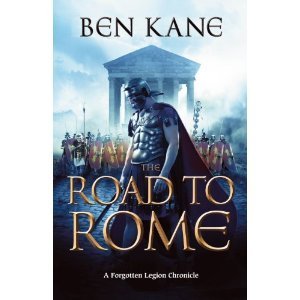 Members of the panel were keen to point out the particular stresses of combat with its "to the death" theme can make for a very human story. It was these tales that the panel thought they were telling - the stories of one individual against the big canvas of armed conflict. The panel were asked whether women writers were equally able to do this, to conjure up the vast battlefields and set pieces of conflict, and several mentioned Robyn Young (author of The Brethren Trilogy and the new Insurrection.)
Members of the panel were keen to point out the particular stresses of combat with its "to the death" theme can make for a very human story. It was these tales that the panel thought they were telling - the stories of one individual against the big canvas of armed conflict. The panel were asked whether women writers were equally able to do this, to conjure up the vast battlefields and set pieces of conflict, and several mentioned Robyn Young (author of The Brethren Trilogy and the new Insurrection.)
In times past, life was altogether more violent and this difference can alienate readers. Difficult areas that challenge readers are (unsurprisingly) rape scenes, and those featuring violence to animals. One of the panel said he had had complaints about a scene involving dismembering a dog although readers were happy to accept the same if the victim was human. In early cultures, particularly slave cultures, rape was endemic, for example in ancient Rome. Rape in any case was less about sexuality and more about status - i.e. it was acceptable in Rome if you were the rapist, but to be the victim was seen as dropping status. After hearing the all male panel dicuss this, it was a contrast to hear from the softly-spoken writer for young adults, Ann Turnbull.
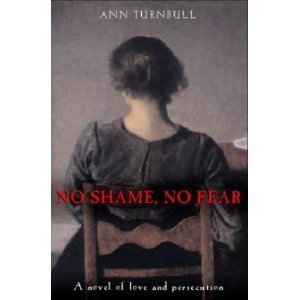
Ann Turnbull writes historical fiction for young adults - a booming market which she says used to be almost invisible. Her books are set in the seventeenth century and focus on the Civil War, the Plague Years and the Great Fire of London. I have to say that to write of these subjects was probably a smart move as all these are on the standard history curriculum, although for younger children, and that her books seem to be doing very well despite somebody saying earlier in the day that the 17th century was difficult to sell. Ann's talk entertained us with a powerpoint presentation of maps of old London, engravings of a 17th century printers workshop, and forbidden Quaker meetings. Originally a writer of books for younger children Ann was delighted when her publisher suggested she should try writing historicals for Young Adults. Each book is 70-80000 words long, so each takes considerable research. But there is no doubt that there is a market there now for historical fiction for young adults where there wasn't one before.
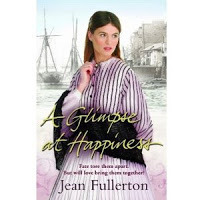 The final presentation was from Jean Fullerton, whose immensely popular London based books are impeccably researched. "Ground your fiction in Fact" was the title of the session, as Jean is a firm believer in doing your homework, and goes to great lengths to make sure everything is as accurate as possible. She told us to look beneath the surface of the usual view and unearth the lesser known facts, for example that there were many black Victorians in London, but these images are not ones we would usually associate with Victorian London. She has the advantage of living in the place she writes about and has used her local contacts and the local studies archives to uncover exactly what was on the streets she writes of, so she can feature real pubs and shops. She even researched what grades of coal were on sale during the period she was describing.When challenged that such detailed research might be wasteful as it hardly features in the book, and time could be better spent writing, Jean took the view that if the writer knows the detail, then this will convey to the reader even if not in the most obvious way. And I have to say I agree - the confidence that comes from knowing your stuff helps the writing process and gives a flavour of veracity.
The final presentation was from Jean Fullerton, whose immensely popular London based books are impeccably researched. "Ground your fiction in Fact" was the title of the session, as Jean is a firm believer in doing your homework, and goes to great lengths to make sure everything is as accurate as possible. She told us to look beneath the surface of the usual view and unearth the lesser known facts, for example that there were many black Victorians in London, but these images are not ones we would usually associate with Victorian London. She has the advantage of living in the place she writes about and has used her local contacts and the local studies archives to uncover exactly what was on the streets she writes of, so she can feature real pubs and shops. She even researched what grades of coal were on sale during the period she was describing.When challenged that such detailed research might be wasteful as it hardly features in the book, and time could be better spent writing, Jean took the view that if the writer knows the detail, then this will convey to the reader even if not in the most obvious way. And I have to say I agree - the confidence that comes from knowing your stuff helps the writing process and gives a flavour of veracity.
Jean finished by saying we will never be able to get it all right - there will always be something we miss and kick ourselves over once it has gone to the printer, but that is inevitable. The main thing is to have done the research the best way you are able.
In the gaps between the sessions I was able to network with other writers, both published and unpublished, and have the "writerly" conversations I am so often starved of at home, so my thanks go to the organisers and to the speakers. I look forward to next time!
Sometimes you can end up a little drunk on other people's unwritten stories and enthusiasm!
In the afternoon we were treated to "A History of Violence" with panellists Harry Sidebottom, Doug Jackson, Robert Low and Ben Kane. There was general agreement amongst the panel that violence was a thrill that the adrenaline-junkie male sought through his reading in this somewhat sanitised society, and that combat and war are subjects that are somehow "sexy" at some visceral level.
 Members of the panel were keen to point out the particular stresses of combat with its "to the death" theme can make for a very human story. It was these tales that the panel thought they were telling - the stories of one individual against the big canvas of armed conflict. The panel were asked whether women writers were equally able to do this, to conjure up the vast battlefields and set pieces of conflict, and several mentioned Robyn Young (author of The Brethren Trilogy and the new Insurrection.)
Members of the panel were keen to point out the particular stresses of combat with its "to the death" theme can make for a very human story. It was these tales that the panel thought they were telling - the stories of one individual against the big canvas of armed conflict. The panel were asked whether women writers were equally able to do this, to conjure up the vast battlefields and set pieces of conflict, and several mentioned Robyn Young (author of The Brethren Trilogy and the new Insurrection.)In times past, life was altogether more violent and this difference can alienate readers. Difficult areas that challenge readers are (unsurprisingly) rape scenes, and those featuring violence to animals. One of the panel said he had had complaints about a scene involving dismembering a dog although readers were happy to accept the same if the victim was human. In early cultures, particularly slave cultures, rape was endemic, for example in ancient Rome. Rape in any case was less about sexuality and more about status - i.e. it was acceptable in Rome if you were the rapist, but to be the victim was seen as dropping status. After hearing the all male panel dicuss this, it was a contrast to hear from the softly-spoken writer for young adults, Ann Turnbull.

Ann Turnbull writes historical fiction for young adults - a booming market which she says used to be almost invisible. Her books are set in the seventeenth century and focus on the Civil War, the Plague Years and the Great Fire of London. I have to say that to write of these subjects was probably a smart move as all these are on the standard history curriculum, although for younger children, and that her books seem to be doing very well despite somebody saying earlier in the day that the 17th century was difficult to sell. Ann's talk entertained us with a powerpoint presentation of maps of old London, engravings of a 17th century printers workshop, and forbidden Quaker meetings. Originally a writer of books for younger children Ann was delighted when her publisher suggested she should try writing historicals for Young Adults. Each book is 70-80000 words long, so each takes considerable research. But there is no doubt that there is a market there now for historical fiction for young adults where there wasn't one before.
 The final presentation was from Jean Fullerton, whose immensely popular London based books are impeccably researched. "Ground your fiction in Fact" was the title of the session, as Jean is a firm believer in doing your homework, and goes to great lengths to make sure everything is as accurate as possible. She told us to look beneath the surface of the usual view and unearth the lesser known facts, for example that there were many black Victorians in London, but these images are not ones we would usually associate with Victorian London. She has the advantage of living in the place she writes about and has used her local contacts and the local studies archives to uncover exactly what was on the streets she writes of, so she can feature real pubs and shops. She even researched what grades of coal were on sale during the period she was describing.When challenged that such detailed research might be wasteful as it hardly features in the book, and time could be better spent writing, Jean took the view that if the writer knows the detail, then this will convey to the reader even if not in the most obvious way. And I have to say I agree - the confidence that comes from knowing your stuff helps the writing process and gives a flavour of veracity.
The final presentation was from Jean Fullerton, whose immensely popular London based books are impeccably researched. "Ground your fiction in Fact" was the title of the session, as Jean is a firm believer in doing your homework, and goes to great lengths to make sure everything is as accurate as possible. She told us to look beneath the surface of the usual view and unearth the lesser known facts, for example that there were many black Victorians in London, but these images are not ones we would usually associate with Victorian London. She has the advantage of living in the place she writes about and has used her local contacts and the local studies archives to uncover exactly what was on the streets she writes of, so she can feature real pubs and shops. She even researched what grades of coal were on sale during the period she was describing.When challenged that such detailed research might be wasteful as it hardly features in the book, and time could be better spent writing, Jean took the view that if the writer knows the detail, then this will convey to the reader even if not in the most obvious way. And I have to say I agree - the confidence that comes from knowing your stuff helps the writing process and gives a flavour of veracity.Jean finished by saying we will never be able to get it all right - there will always be something we miss and kick ourselves over once it has gone to the printer, but that is inevitable. The main thing is to have done the research the best way you are able.
In the gaps between the sessions I was able to network with other writers, both published and unpublished, and have the "writerly" conversations I am so often starved of at home, so my thanks go to the organisers and to the speakers. I look forward to next time!
Published on October 28, 2010 04:38
October 25, 2010
Snippets from the Historical Novel Society Conference
The venue for this year's conference was the Mechanics Institute in Manchester, a solid edifice with an imposing stone staircase and walls full of prints and ephemera from the history of the Trades Unions.
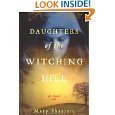 Unfortunately I couldn't be in two places at once so I had to make choices about which speakers I would listen to. The first was Mary Sharratt - seated in amongst us at a round table around which we all squashed ourselves - she was a very popular speaker and rightly so. Her talk on "The Daughters of Witching Hill", her new novel, was exemplary. She gave us plenty of historical detail about the religious and social background to the book - how the Reformation changed attitudes to Catholicism, how the 17th century beliefs in spirits and the power of the cunning woman were repressed during the rise of Puritanism. Her extracts were well-chosen, and we all got to hear her read a little of the voices of the characters, during which you could hear a pin drop. She had photocopied some chapbooks and documents of the time which she referred to, and these added a note of veracity to what was a very well-planned and interesting session. And "The Daughters of Witching Hill" sounds like a great read.
Unfortunately I couldn't be in two places at once so I had to make choices about which speakers I would listen to. The first was Mary Sharratt - seated in amongst us at a round table around which we all squashed ourselves - she was a very popular speaker and rightly so. Her talk on "The Daughters of Witching Hill", her new novel, was exemplary. She gave us plenty of historical detail about the religious and social background to the book - how the Reformation changed attitudes to Catholicism, how the 17th century beliefs in spirits and the power of the cunning woman were repressed during the rise of Puritanism. Her extracts were well-chosen, and we all got to hear her read a little of the voices of the characters, during which you could hear a pin drop. She had photocopied some chapbooks and documents of the time which she referred to, and these added a note of veracity to what was a very well-planned and interesting session. And "The Daughters of Witching Hill" sounds like a great read.
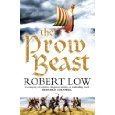 Robert Low was next, talking about Reportage, Re-enactment and Fiction. A very imposing-looking man with a plaited beard, he looks as his readers might hope he would. His lively talk ranged across his experiences as a war reporter and re-enacter. As he pointed out, historical fiction is a genre with no awards, no specific shelf in a bookshop.
Robert Low was next, talking about Reportage, Re-enactment and Fiction. A very imposing-looking man with a plaited beard, he looks as his readers might hope he would. His lively talk ranged across his experiences as a war reporter and re-enacter. As he pointed out, historical fiction is a genre with no awards, no specific shelf in a bookshop.
And for myself, probably my affinity with Viking, Roman or other so-called Sword and Sandals fiction is about the same as my affinity with Crime or Chick-Lit - i.e they are novels, but that's about as far as it goes. One end of the genre can feel miles away from another, separated by aeons in both time and writing style. So it always feels a little odd for us all to be lumped together in one genre.
But as a novelist Robert had some great things to say about the writer remaining invisible, listed with great good humour. My favourites were "Never open with the weather - the reader is looking for people","Try to leave out the parts readers skip", "If it sounds like writing, re-write it."
He said whatever the accuracy of our research in the end our "only obligation is to be persuasive," and I have to say this seemed a very good argument.
The Panel Discussion, "Where next for Historical Fiction?" chaired by Doug Jackson with Jim Gill (United Agents) Marcy Posner (Folio Literary Management) began by looking back to see where the current revival in interest in HF has come from, and traced it back to the rise of interest in historical non-fiction, particularly Simon Schama's History of Britain, and books such as "Longitude" - non-fiction narratives which then paved the way for fiction. Readers like the "added value" of entertainment plus education that some HF provides. However, we need to be wary that we don't become so concerned with being accurate that we forget to write a novel! Story is key.
The conversation ranged over the power of the cover (8 seconds to make your choice in Tesco) to the fact that contrary to most writers' opinions, interest in the Tudors shows no sign of waning. On the contrary, readers like to read books where they already have a smattering of knowledge. Periods the reader has scant knowledge of will fail to sell. The English Civil War, although it has a lot going for it in terms of dramaic action, is apparently a difficult period as readers do not understand the complex causes of the conflict and therefore have no "in" on the subject. (Shame, as that is my period!)
Marcy Posner said there was absolutely no market for WWII novels in the States.
She also said that since the rise of ebooks and self-publishing it was interesting that no less than five new independent bookshops have opened in New York, indicating that the public are wanting a more informed choice and a personal service. Good news for all of us whose books are somewhere in the mid-list.
Both Jim and Marcy agreed that the job of the novelist includes being "out and about", although there is no hard evidence to show (certainly in the States ) that readings and tours work to sell more books. Generally, facebook, tweeting, blogs etc do not necessarily increase your profile as there is so much "information static" drowning out the potential to connect with readers. This was contested by some members who thought that they had successfully used these media to sell their own books.
In the afternoon I listened to a Panel Discussion on A History of Violence" and Ann Turnbull talking about Love and conflict in the 17th century. This was followed by Jean Fullerton's presentation "Ground your fiction in Fact." I also had a very entertaining lunch, and a discussion with two other writers about the benefits of the Kindle.More about these in my next post.
 Unfortunately I couldn't be in two places at once so I had to make choices about which speakers I would listen to. The first was Mary Sharratt - seated in amongst us at a round table around which we all squashed ourselves - she was a very popular speaker and rightly so. Her talk on "The Daughters of Witching Hill", her new novel, was exemplary. She gave us plenty of historical detail about the religious and social background to the book - how the Reformation changed attitudes to Catholicism, how the 17th century beliefs in spirits and the power of the cunning woman were repressed during the rise of Puritanism. Her extracts were well-chosen, and we all got to hear her read a little of the voices of the characters, during which you could hear a pin drop. She had photocopied some chapbooks and documents of the time which she referred to, and these added a note of veracity to what was a very well-planned and interesting session. And "The Daughters of Witching Hill" sounds like a great read.
Unfortunately I couldn't be in two places at once so I had to make choices about which speakers I would listen to. The first was Mary Sharratt - seated in amongst us at a round table around which we all squashed ourselves - she was a very popular speaker and rightly so. Her talk on "The Daughters of Witching Hill", her new novel, was exemplary. She gave us plenty of historical detail about the religious and social background to the book - how the Reformation changed attitudes to Catholicism, how the 17th century beliefs in spirits and the power of the cunning woman were repressed during the rise of Puritanism. Her extracts were well-chosen, and we all got to hear her read a little of the voices of the characters, during which you could hear a pin drop. She had photocopied some chapbooks and documents of the time which she referred to, and these added a note of veracity to what was a very well-planned and interesting session. And "The Daughters of Witching Hill" sounds like a great read. Robert Low was next, talking about Reportage, Re-enactment and Fiction. A very imposing-looking man with a plaited beard, he looks as his readers might hope he would. His lively talk ranged across his experiences as a war reporter and re-enacter. As he pointed out, historical fiction is a genre with no awards, no specific shelf in a bookshop.
Robert Low was next, talking about Reportage, Re-enactment and Fiction. A very imposing-looking man with a plaited beard, he looks as his readers might hope he would. His lively talk ranged across his experiences as a war reporter and re-enacter. As he pointed out, historical fiction is a genre with no awards, no specific shelf in a bookshop. And for myself, probably my affinity with Viking, Roman or other so-called Sword and Sandals fiction is about the same as my affinity with Crime or Chick-Lit - i.e they are novels, but that's about as far as it goes. One end of the genre can feel miles away from another, separated by aeons in both time and writing style. So it always feels a little odd for us all to be lumped together in one genre.
But as a novelist Robert had some great things to say about the writer remaining invisible, listed with great good humour. My favourites were "Never open with the weather - the reader is looking for people","Try to leave out the parts readers skip", "If it sounds like writing, re-write it."
He said whatever the accuracy of our research in the end our "only obligation is to be persuasive," and I have to say this seemed a very good argument.
The Panel Discussion, "Where next for Historical Fiction?" chaired by Doug Jackson with Jim Gill (United Agents) Marcy Posner (Folio Literary Management) began by looking back to see where the current revival in interest in HF has come from, and traced it back to the rise of interest in historical non-fiction, particularly Simon Schama's History of Britain, and books such as "Longitude" - non-fiction narratives which then paved the way for fiction. Readers like the "added value" of entertainment plus education that some HF provides. However, we need to be wary that we don't become so concerned with being accurate that we forget to write a novel! Story is key.
The conversation ranged over the power of the cover (8 seconds to make your choice in Tesco) to the fact that contrary to most writers' opinions, interest in the Tudors shows no sign of waning. On the contrary, readers like to read books where they already have a smattering of knowledge. Periods the reader has scant knowledge of will fail to sell. The English Civil War, although it has a lot going for it in terms of dramaic action, is apparently a difficult period as readers do not understand the complex causes of the conflict and therefore have no "in" on the subject. (Shame, as that is my period!)
Marcy Posner said there was absolutely no market for WWII novels in the States.
She also said that since the rise of ebooks and self-publishing it was interesting that no less than five new independent bookshops have opened in New York, indicating that the public are wanting a more informed choice and a personal service. Good news for all of us whose books are somewhere in the mid-list.
Both Jim and Marcy agreed that the job of the novelist includes being "out and about", although there is no hard evidence to show (certainly in the States ) that readings and tours work to sell more books. Generally, facebook, tweeting, blogs etc do not necessarily increase your profile as there is so much "information static" drowning out the potential to connect with readers. This was contested by some members who thought that they had successfully used these media to sell their own books.
In the afternoon I listened to a Panel Discussion on A History of Violence" and Ann Turnbull talking about Love and conflict in the 17th century. This was followed by Jean Fullerton's presentation "Ground your fiction in Fact." I also had a very entertaining lunch, and a discussion with two other writers about the benefits of the Kindle.More about these in my next post.
Published on October 25, 2010 05:21
October 21, 2010
The Gilded Lily to be published by Pan Macmillan
 I am delighted to announce that my second novel, The Gilded Lily will be published by Pan Macmillan, date of publication to be confirmed soon.
I am delighted to announce that my second novel, The Gilded Lily will be published by Pan Macmillan, date of publication to be confirmed soon.The Gilded Lily is a companion volume to The Lady's Slipper, but can also be read as a stand-alone novel.
The Gilded Lily
a Winter of Snow and Ice 1661
Timid Sadie Appleby has always lived in her small village. One night she is rudely awoken by her older and bolder sister, Ella, who has robbed her employer and is on the run. The girls flee their rural home of Westmorland to head for London, hoping to lose themselves in the teeming city. But the dead man's relatives are in hot pursuit, and soon a game of cat and mouse begins.
Ella is soon obsessed with the glitter and glamour of city life and sets her sights on flamboyant man-about-town, Jay Whitgift. But nothing is what it seems - not even Jay Whitgift.
Can Sadie survive a fugitive's life in the big city? But even more
pressing, can she survive life with her older sister Ella?
Set in London's atmospheric coffee houses, the rich mansions of
Whitehall, and the pawnshops, slums and rookeries hidden from rich men's view, The Gilded Lily is about beauty and desire, about the stories we tell ourselves, and about how sisterhood can be both a burden and a saving grace.
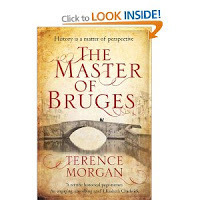 At the same time as I was celebrating my own good news I heard that Terence Morgan, a fellow Macmillan New Writer and author of historical fiction, has signed a similar two book deal with Pan Mac. Check out his recent book, The Master of Bruges. His new one will be entitled "The Last Plantagenet."
At the same time as I was celebrating my own good news I heard that Terence Morgan, a fellow Macmillan New Writer and author of historical fiction, has signed a similar two book deal with Pan Mac. Check out his recent book, The Master of Bruges. His new one will be entitled "The Last Plantagenet."
Published on October 21, 2010 05:33



